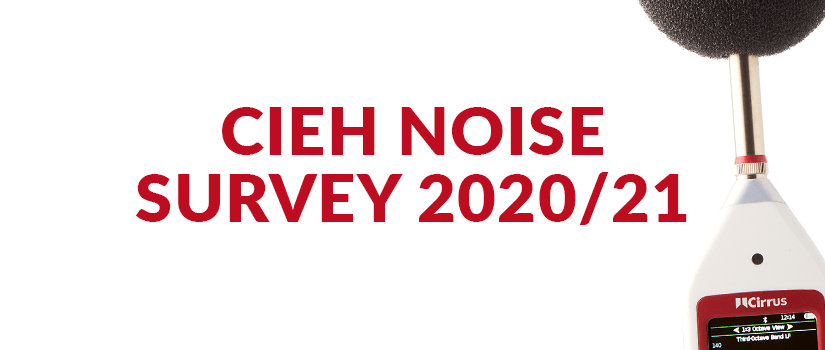The Chartered Institute of Environmental Health (CIEH) has published the results of its flagship noise survey, which saw a significant increase in noise-related complaints. This year’s report found that noise complaints increased by 54% in England between 2019/20 and 2020/21, as people adjusted to life during the first Covid-19 lockdown.
Noise is the single biggest cause for complaints made to local authorities in the UK, and according to the World Health Organisation (WHO), noise is a disease burden that is second in magnitude only to that from air pollution. In 2020, COVID-19 changed the habits of many with the implementation of working from home, homeschooling and furlough. The report covered three lockdowns against a backdrop of different restrictions.
The report found that environmental health professionals, working in local authorities to investigate the complaints and take formal action were under extreme pressure. As well as being involved in enforcing COVID-related restrictions, the workload per officer doubled due to the increased noise complaints last year. The average environmental health officer in England investigated 633 complaints per year in 2020/21, compared to an average officer dealing with 299 complaints in 2019/20.
However, the report discovered significant variation between different regions of England. Greater London had the highest rate of noise complaints, 508 complaints for every 10,000 people – over three times the national average – whilst the South West received the lowest rate of noise complaints, 32 per 10,000 people. Workloads also varied greatly, with environmental health officers in Greater London dealing with an average of 1,715 complaints per officer whilst those in the East of England received the lowest average of 190 complaints per officer.
Other key findings from the report include:
- A total of 356,367 noise complaints were recorded by 144 local authorities; on average 149 complaints for every 10,000 people
- 11,211 formal actions were taken by responding local authorities
- The Anti-social Behaviour, Crime and Policing Act 2012 was the most commonly used legislation to take formal action by local authorities
- There were 88 noise-related prosecutions
Unsurprisingly, residential noise accounted for the largest proportion of complaints; this was the case across all regions of England. The number of complaints received by the commercial or leisure sector and construction sector was similar (12,788 and 14,052), with the industrial sector receiving the lowest amount (4,808). Other sources of noise complaints recorded by local authorities included noise in the street, vehicles, machinery and equipment, dogs, agriculture, alarms, military, traffic and railways.
The CIEH England 2020/21 Noise Survey is supported by Cirrus Research and the Noise Abatement Society and data from the survey is being monitored by the Department for Environment, Food and Rural Affairs (DEFRA)
Noise data for Wales has also been collected by CIEH and will be released in Spring 2022, whilst the noise data from Northern Ireland is collected by the Department of Agriculture, Environment and Rural Affairs (DAERA), which published 2018/19 data at the end of last year.
Julie Barratt, CIEH President, said:
“Environmental health professionals (EHP) have worked tirelessly throughout the pandemic and this survey demonstrates the significant pressure they were under, with average workloads almost doubling due to increased noise complaints.
Noise is not only a source of annoyance but also has a profound impact on people’s health, wellbeing and quality of life. It has been linked to increasing the risk of cardiovascular disease and potentially other cardiometabolic diseases, including strokes and diabetes.
EHPs are at the forefront of receiving and resolving noise complaints and deserve recognition for the important contributions they have made to supporting and protecting the nation’s public health.
This survey covered a period of three national lockdowns and a range of government measures and highlights the effect of COVID-19 on noise complaints, and with it, on public health.”
Richard Cutting, Cirrus Research UK Sales Manager said:
“The rise in complaints has not come as a surprise to our local authority clients. With changing lifestyle habits resulting from Covid, particularly the increase in home working, they have certainly had their work cut out for them.
Thanks to a long-standing relationship with local councils across the UK, Cirrus Research has been able to support them in numerous ways. By providing our trusted nuisance noise recorder, the Trojan, online training and other resources, and developing a free-of-charge web app for their residents to help triage complaints, we are doing everything we can to lessen the burden faced by environmental health practitioners. In doing so, we’re helping them to keep the peace in their communities with far less effort.”
Gloria Elliott OBE, chief executive, Noise Abatement Society said:
“Noise is a major nuisance and pollutant that seriously affects people’s health and wellbeing.
The CIEH Noise Survey provides valuable evidence that noise profoundly and adversely impacts our quality of life, productivity and peaceful enjoyment of our homes. In the discussion about how we truly build back better, noise mustn’t be forgotten.
We want to see good acoustic design applied holistically in all development for the benefit of all.”
You can find out more about the Chartered Institute of Environmental Health and the noise survey by visiting their website.



